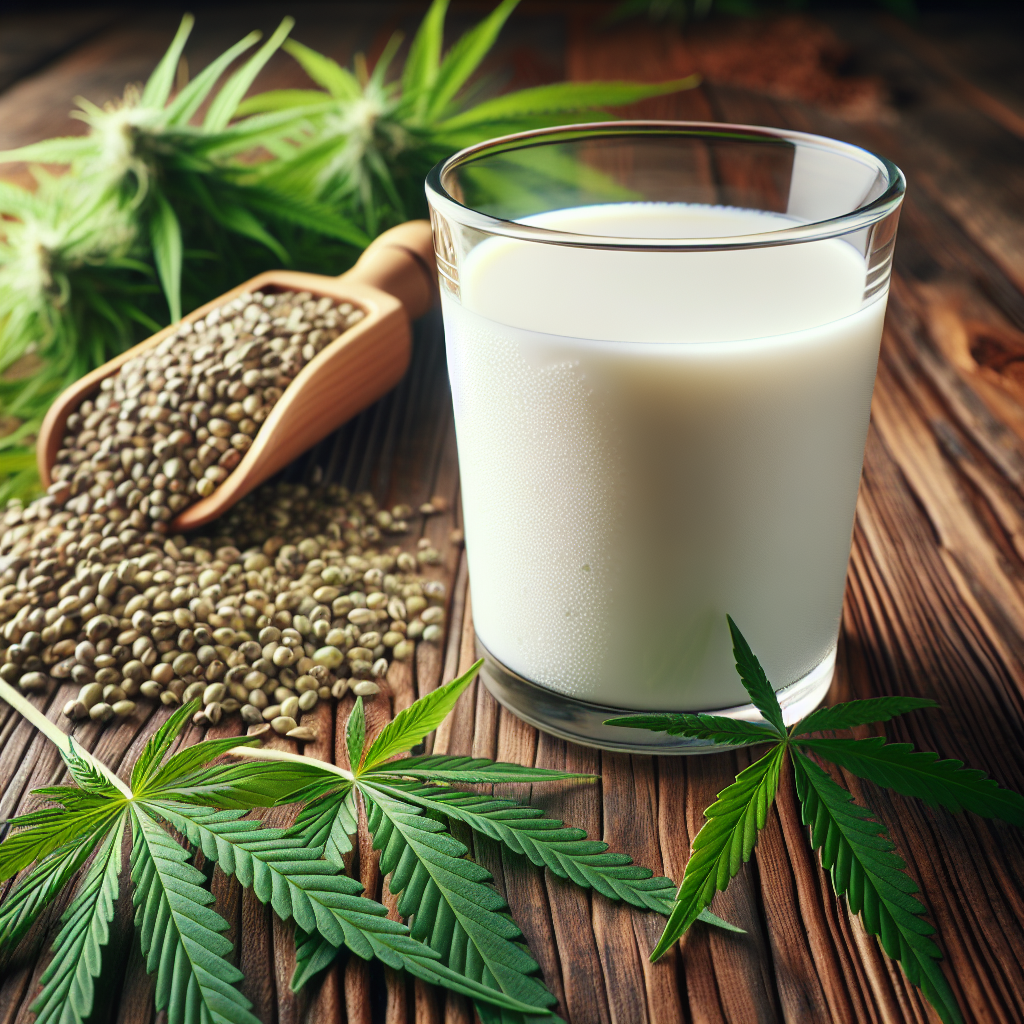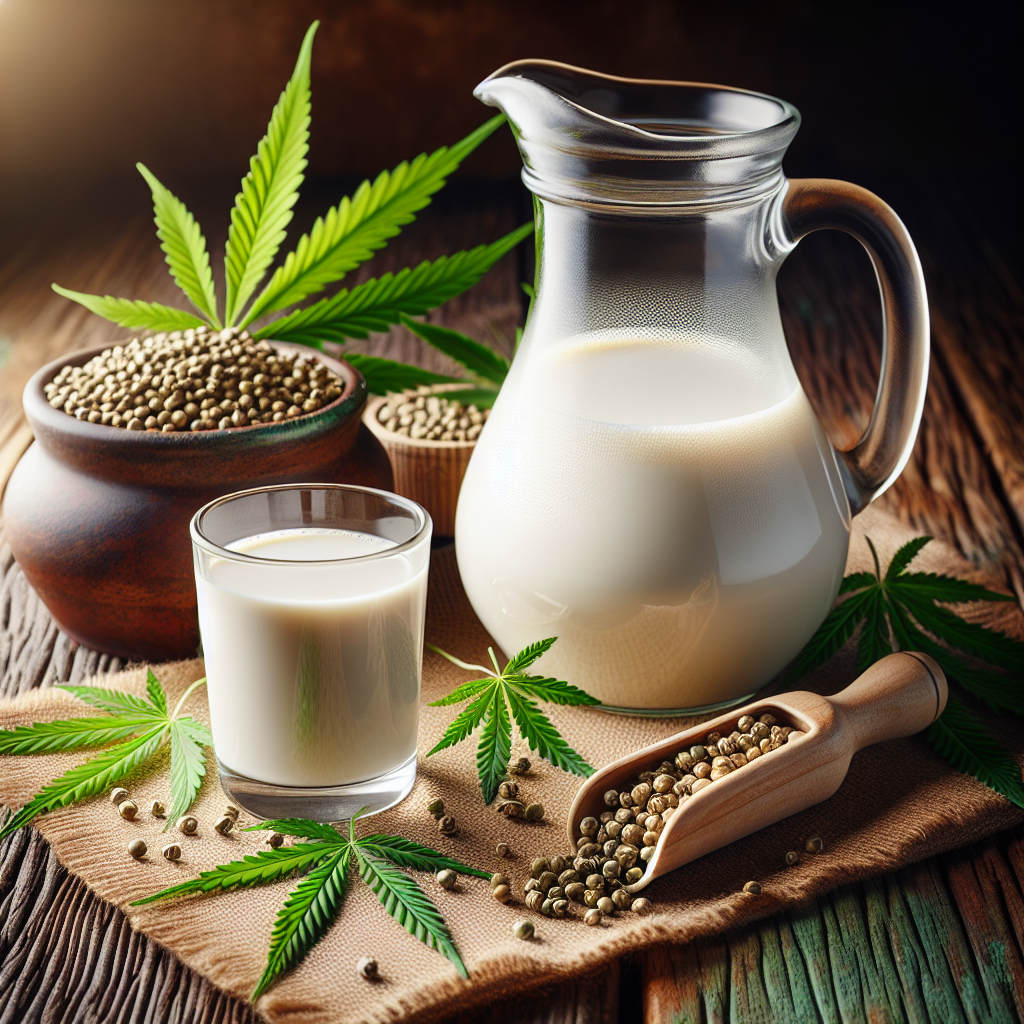Hemp milk is rapidly becoming a popular choice among those seeking a nutritious, plant-based alternative to traditional dairy. Derived from the seeds of the hemp plant, this beverage offers a multitude of health benefits and is a perfect option for those with lactose intolerance or anyone looking to diversify their diet.
One of the standout features of hemp milk is its impressive nutritional profile. It is rich in essential fatty acids, particularly omega-3 and omega-6, which are crucial for heart health and brain function. Additionally, hemp milk is a great source of plant-based protein, making it an excellent option for vegans and vegetarians. It also contains significant amounts of vitamins and minerals, including calcium, magnesium, and vitamin D, which contribute to overall wellness.
Another reason for its growing popularity is its environmental benefits. Hemp is a sustainable crop that requires minimal water and no pesticides, making it an eco-friendly choice for conscientious consumers. Unlike other plant-based milks, hemp milk does not require extensive processing, which further reduces its environmental footprint.
For those who like to experiment in the kitchen, hemp milk offers endless flavor possibilities. It can be easily customized with natural sweeteners, vanilla, cocoa, or even fruits to create a variety of delicious and nutritious drinks. Whether enjoyed on its own, added to coffee, or used in smoothies and recipes, hemp milk is versatile and delightful.
Ready to make your own hemp milk at home? Get yours today! here
Nutritional Benefits of Hemp Milk
Hemp milk is not just a tasty alternative to dairy milk; it is also a powerhouse of nutrition. This plant-based beverage is packed with essential nutrients that can contribute to a balanced and healthy diet. Here are some of the key nutritional benefits of hemp milk:
- High-Quality Protein: Hemp milk contains all nine essential amino acids, making it a complete protein. This is particularly beneficial for vegans and vegetarians who may struggle to get enough protein from plant-based sources.
- Healthy Fats: Rich in omega-3 and omega-6 fatty acids, hemp milk supports heart health, reduces inflammation, and promotes brain function. The balanced ratio of these fatty acids is ideal for maintaining overall wellness.
- Vitamins and Minerals: Hemp milk is a great source of important vitamins and minerals, including calcium, iron, magnesium, potassium, and vitamin D. These nutrients are essential for bone health, energy production, and immune function.
- Low in Sugar: Unlike many store-bought plant-based milks, hemp milk can be made with little to no added sugar, making it a healthier option for those watching their sugar intake.
- Digestive Health: Hemp milk is naturally free from lactose, making it an excellent choice for individuals with lactose intolerance. It is also gentle on the digestive system and can be easier to digest compared to some other plant-based milks.
Incorporating hemp milk into your diet can provide a wide array of health benefits, from improved heart health to stronger bones. Its rich nutrient profile makes it a valuable addition to any health-conscious individual's daily routine.
How to Make Hemp Milk at Home

Making hemp milk at home is a simple and rewarding process that allows you to enjoy fresh, additive-free plant-based milk. By doing it yourself, you can also customize the flavor to suit your taste preferences. Here’s a step-by-step guide to making hemp milk at home:
- Ingredients: You’ll need 1 cup of raw hemp seeds, 4 cups of filtered water, and optional sweeteners or flavorings such as vanilla extract, dates, or honey.
- Step 1 - Measure the Ingredients: Start by measuring out one cup of raw hemp seeds and 1300ml of filtered water. If you prefer a creamier milk, you can increase the amount of seeds slightly or add in 1/4 cup of oats.
- Step 2 - Blend: Combine the hemp seeds and water in a high-speed blender. Blend on high for about 60 seconds until the mixture is smooth and creamy. The powerful motor in the MilkDepot.ca blender ensures a smooth consistency without any gritty texture thanks to its built in filtration system.
- Step 3 - Store: Pour your freshly made hemp milk into a glass jar or bottle and store it in the refrigerator. It will keep for up to five days. Be sure to shake well before each use, as natural separation may occur.
By making your own hemp milk, you not only have control over the ingredients but also contribute to reducing waste from packaging. Plus, the process is quick and easy, allowing you to enjoy fresh hemp milk anytime you want.
Hemp Milk Versus Other Plant-Based Milks

When it comes to plant-based milks, there are numerous options available, each with its own set of benefits and characteristics. Hemp milk is gaining popularity for good reason, but how does it stack up against other plant-based milks like almond, soy, and oat milk?
- Nutritional Value: Hemp milk is rich in omega-3 and omega-6 fatty acids, which are essential for heart health. It also contains a good amount of protein and essential amino acids. Almond milk, on the other hand, is lower in calories but doesn’t offer the same level of protein and healthy fats. Soy milk is high in protein but may contain phytoestrogens, which some people prefer to avoid. Oat milk is higher in carbohydrates and fiber, making it a good option for those needing an energy boost but it lacks the essential fatty acids found in hemp milk.
- Allergen-Friendly: One of the significant advantages of hemp milk is that it’s free from common allergens like nuts, soy, and gluten. This makes it an excellent option for individuals with allergies or intolerances. Almond milk, obviously, is not suitable for those with nut allergies, and soy milk is off-limits for those with soy allergies. Oat milk is generally considered hypoallergenic but may contain traces of gluten unless specifically labeled gluten-free.
- Taste and Texture: Hemp milk has a slightly nutty and earthy flavor, which some people find unique and enjoyable. It also has a creamy texture that’s suitable for various culinary uses. Almond milk has a mild, slightly sweet flavor, while soy milk has a more pronounced bean-like taste. Oat milk is known for its creamy texture and naturally sweet taste, making it a favorite for coffee and cereal.
- Environmental Impact: Hemp is a highly sustainable crop, requiring minimal water and no pesticides to grow. This makes hemp milk an eco-friendly choice. Almond milk production, on the other hand, is water-intensive and has a significant environmental footprint. Soy and oat milk have moderate environmental impacts but still require more resources compared to hemp.
In summary, while each plant-based milk has its own merits, hemp milk stands out for its nutritional benefits, allergen-friendly profile, and environmental sustainability. Whether you’re looking for a protein-rich option, a creamy texture, or an eco-friendly choice, hemp milk has something unique to offer.
Health Benefits of Hemp Milk

Hemp milk is not only a delicious and versatile plant-based beverage but also a powerhouse of nutrients that offer numerous health benefits. Incorporating hemp milk into your diet can contribute to overall well-being in several ways.
- Rich in Essential Fatty Acids: Hemp milk is an excellent source of omega-3 and omega-6 fatty acids, which are crucial for heart health, brain function, and reducing inflammation. These fatty acids help maintain a healthy balance of cholesterol levels and support cardiovascular health.
- High-Quality Protein: Unlike many other plant-based milks, hemp milk contains a significant amount of protein, including all nine essential amino acids. This makes it a complete protein source, supporting muscle repair and growth, and overall bodily functions.
- Vitamins and Minerals: Hemp milk is fortified with a variety of vitamins and minerals, including calcium, vitamin D, and vitamin B12, which are essential for bone health, immune function, and energy production. It also contains magnesium and potassium, which help regulate blood pressure and support overall cardiovascular health.
- Digestive Health: Hemp milk is naturally free from lactose, making it an excellent option for those with lactose intolerance. It is also easy to digest and does not cause bloating or discomfort commonly associated with dairy milk. Additionally, the fiber content in hemp milk can promote healthy digestion and regular bowel movements.
- Antioxidant Properties: Hemp seeds, from which hemp milk is made, contain antioxidants like tocopherols and phytol, which help protect the body from oxidative stress and damage caused by free radicals. This can contribute to a reduced risk of chronic diseases and support overall cellular health.
- Supports Skin Health: The omega fatty acids in hemp milk can also benefit skin health by maintaining moisture levels, reducing dryness, and promoting a healthy complexion. These fatty acids play a role in strengthening the skin barrier and preventing issues like eczema and dermatitis.
Incorporating hemp milk into your daily routine can be a simple yet effective way to reap these health benefits. Whether you enjoy it in your morning coffee, smoothie, or as a base for your favorite recipes, hemp milk is a nutritious addition to any diet.
Eco-Friendly Aspects of Hemp Milk

In addition to its numerous health benefits, hemp milk stands out as an environmentally friendly choice among plant-based beverages. The eco-friendly aspects of hemp milk are significant and make it a sustainable option for those looking to reduce their environmental footprint.
- Low Water Usage: Hemp plants require considerably less water to grow compared to other crops such as almonds. This makes hemp cultivation more sustainable and less taxing on water resources, which is crucial in areas facing water scarcity.
- Minimal Pesticides: Hemp plants are naturally resistant to pests, meaning they require fewer pesticides and herbicides. This reduces the chemical load on the environment and helps maintain healthier soil and ecosystems.
- Carbon Sequestration: Hemp plants are known for their ability to absorb carbon dioxide from the atmosphere, contributing to the reduction of greenhouse gases. This process helps combat climate change by lowering the overall carbon footprint.
- Soil Health: Hemp's deep root system helps prevent soil erosion and promotes soil health by returning nutrients back to the ground. This can improve soil fertility and reduce the need for synthetic fertilizers.
- Renewable Resource: Hemp is a fast-growing plant that can be cultivated multiple times a year, making it a highly renewable resource. Its quick growth cycle means it can provide a steady supply of raw materials for hemp milk production.
- Biodegradable By-products: The by-products of hemp milk production, such as hemp seed pulp, are biodegradable and can be used in composting or as animal feed, further minimizing waste and promoting a circular economy.
Choosing hemp milk not only benefits your health but also supports sustainable agricultural practices. By incorporating hemp milk into your diet, you are making a positive impact on the environment.
Ready to make a change that's good for you and the planet? Get yours today!
